Monthly news from the Renewable Carbon Initiative (RCI), February 2025
Let's take a look at what happened in February 2025 at RCI
Welcome to the February edition of RCI’s monthly news! This month, we highlight the release of a major joint report with BIC on biomass availability for defossilising the chemical and materials industries by 2050. We also cover insights from our latest RCI webinar on sustainable chemistry and transport, RCI member Avantium with Polycotton Textile Recycling breakthrough in Nature and RCI’s participation in major industry events. Additionally, we are excited to welcome our newest members – Bakelite (US) and Oxylus Energy (US) – who are driving innovation in renewable materials and CO₂ electrolysis.
1. Unveiling of the Clean Industrial Deal
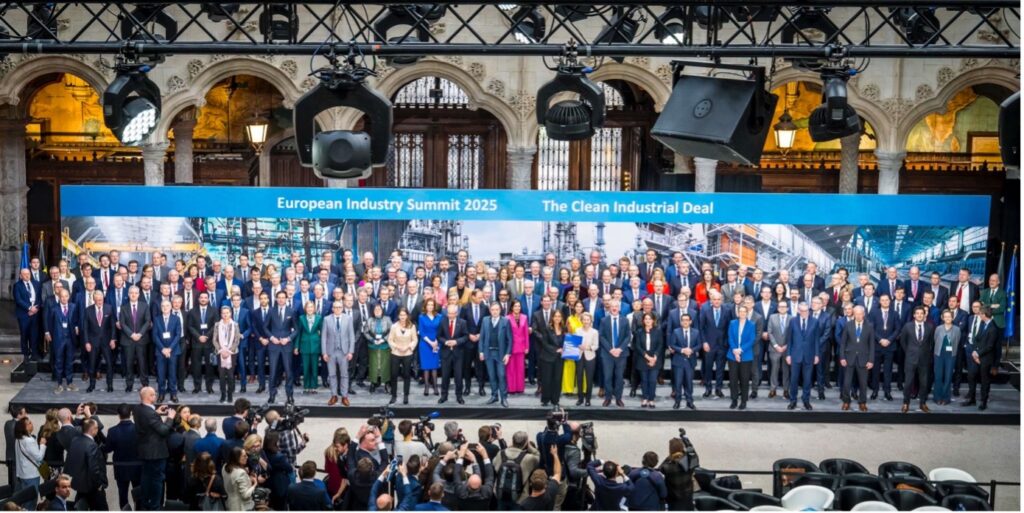
On 26 February, the European Union unveiled the highly anticipated Clean Industrial Deal (CID), which aims to save Europe from failing industries and reignite the bloc's green growth hopes. The Deal presents measures to boost every stage of production, with a focus on:
As supporter of the Antwerp Declaration, RCI was invited to join a launch event in Antwerp on 26 February. At the event, Commission President Ursula von der Leyen presented the unveiled deal. From our perspective, the focus in the CID highly welcome as the chemical sector as well as the potential clean solutions within are involved. The unveiled deal aims to support the chemicals and derivatives industry in several concrete ways:
- Affordable Energy: The Commission adopted the Affordable Energy Action Plan, to make energy and electricity more affordable and bring down costs of supply
- Boosting demand for clean products: The Deal will increase demand for EU-made clean products, looking to develop lead markets by introducing sustainability, resilience, and 'made in Europe' criteria e.g. in public and private procurements.
- Financial support: The Clean Industrial Deal will mobilise over €100 billion to support EU-made clean manufacturing and proposes an “Industrial Decarbonisation Bank” based on available funds in the Innovation Fund, additional revenues resulting from parts of the ETS as well as the revision of InvestEU
- Circularity and access to materials: adopt a Circular Economy Act in 2026 to accelerate the circular transition and ensure that scarce materials are used and reused efficiently, reduce our global dependencies and create high-quality jobs. The aim is to have 24% of materials circular by 2030.
- Acting on global scale: The Commission intends to launch novel “Clean Trade and Investment Partnerships”, while at the same time increasing resilience of the EU through trade defence mechanisms. The CBAM is a focus topic in this context.
Find out more about the Clean Industrial Deal at https://commission.europa.eu/topics/eu-competitiveness/clean-industrial-deal_en
2. Publication and webinar: Joint BIC and RCI Scientific Background Report

The joint BIC and RCI Scientific Background Report “Is there Enough Biomass to Defossilise the Chemicals and Derived Materials Sector by 2050?” was published on 3 February 2025. The report presents the findings of a joint project of the Bio-based Industries Consortium (BIC) and the Renewable Carbon Initiative (RCI), which focuses on whether agricultural and woody biomass combined sustainably provide enough biomass to meet 20% of the future carbon demand of the chemical and derived materials industries in 2050 (up from 5.5% (EU27) and 10% (global) in 2023).
The report concludes that sustainably meeting 20% of total carbon demand of the chemicals and derived materials sector in 2050 via biomass seems a realistic and achievable estimate in a moderate high-tech scenario.
The publication was supported by a public webinar which took place on 3 February 2025 and attracted 450 participants (access the slides here), a portal article, as well a press release.
Find the full report at our publication platform.
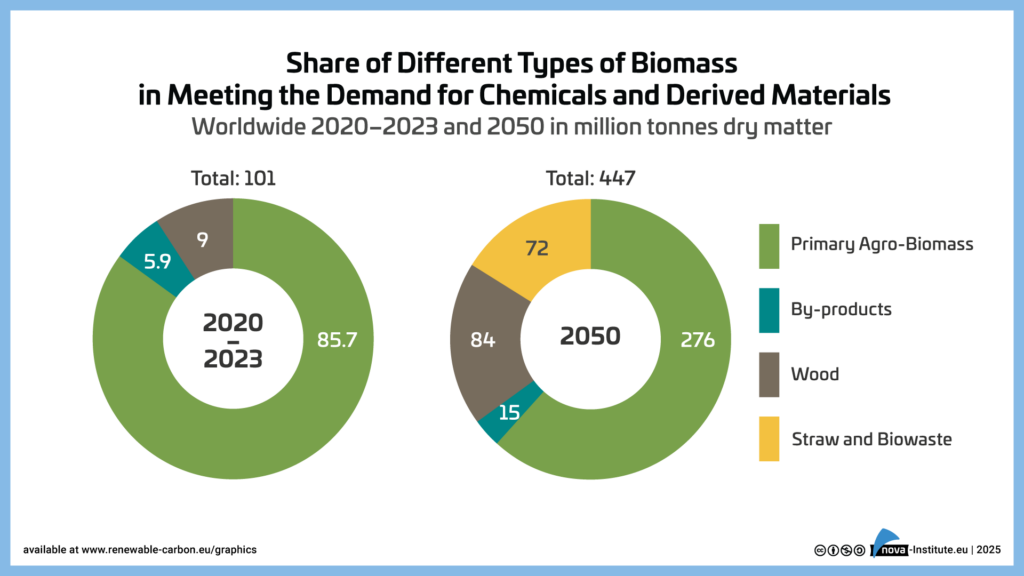
3. RCI member Avantium in Nature: Breakthrough in Polycotton Textile Waste Recycling
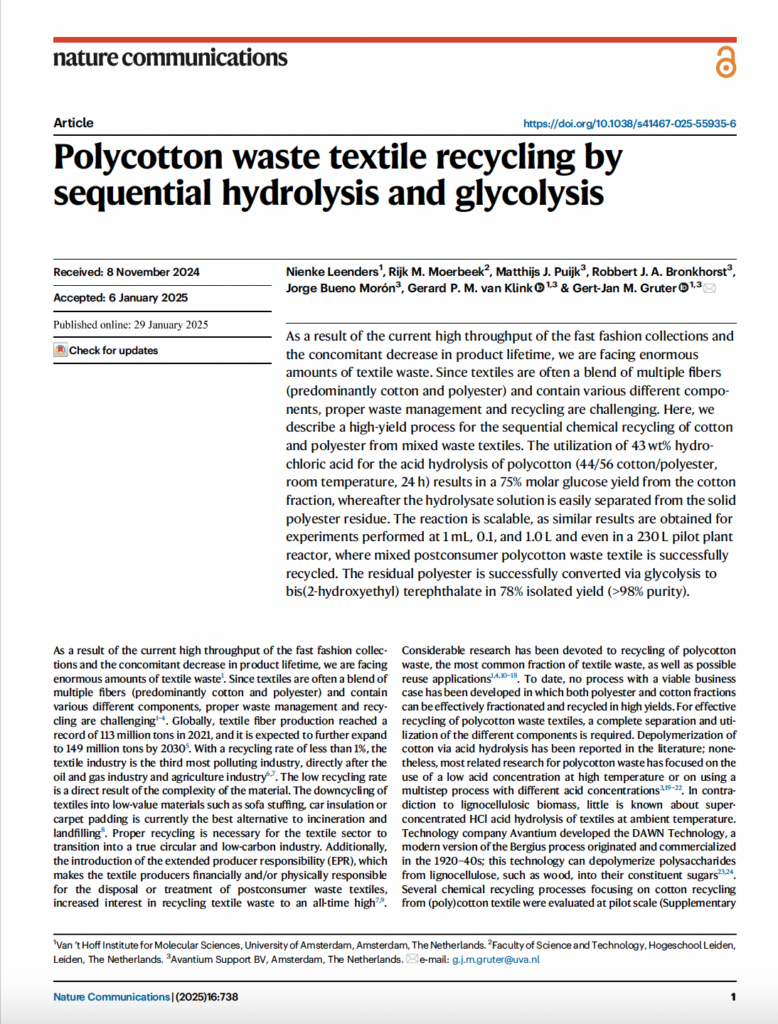
In a notable development for the textile industry, Avantium (NL), focusing on renewable and circular polymer materials, and a member of the RCI, has presented an innovative solution for recycling polycotton waste. This revolutionary technology, recently published in the prestigious journal Nature Communications, promises to address one of the most persistent challenges in textile recycling.
Avantium's patented technology uses hydrochloric acid to break down the cotton component of polycotton fabric into glucose, while leaving the polyester intact. This process enables complete fiber-to-fiber recycling, allowing polyester to be fully recycled, while the cotton-derived glucose can be repurposed as a feedstock for various industrial applications.
Read the full paper here: https://www.nature.com/articles/s41467-025-55935-6
4. Latest RCI Webinar – 18 February 2025
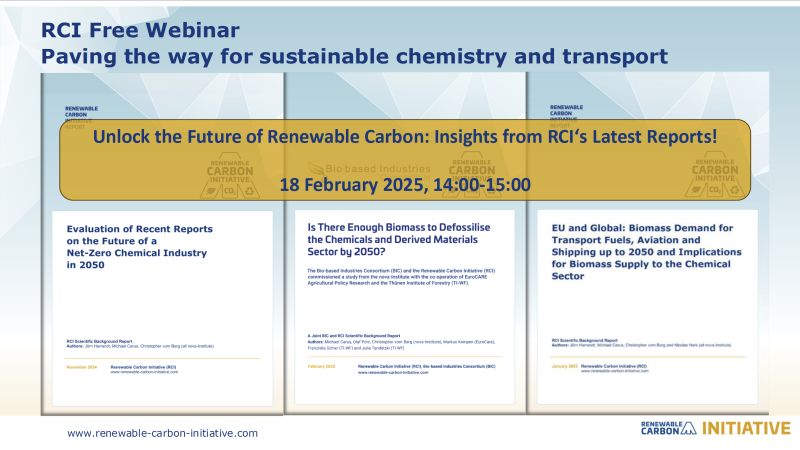
On 18 February, from 14:00 to 15:00 CET, Michael Carus delivered an insightful presentation on the key findings from three recent RCI reports, under the theme "Paving the Way for Sustainable Chemistry and Transport." The webinar highlighted the main takeaways from the following reports:
- The Future of a Net-Zero Chemical Industry by 2050 (November 2024)
- Biomass Demand for Transport Fuels, Aviation, and Shipping up to 2050: Global and EU Perspectives (January 2025)
- Biomass Supply & Demand for the Chemical and Materials Industry (Joint Study with BIC, February 2025)
The webinar was well attended, with 105 participants joining the session.
Find the full reports here: https://renewable-carbon.eu/publications/?search=1&publication-type=rci-papers
5. RCI at the 9th European Chemistry Partnering (ECP) in Frankfurt
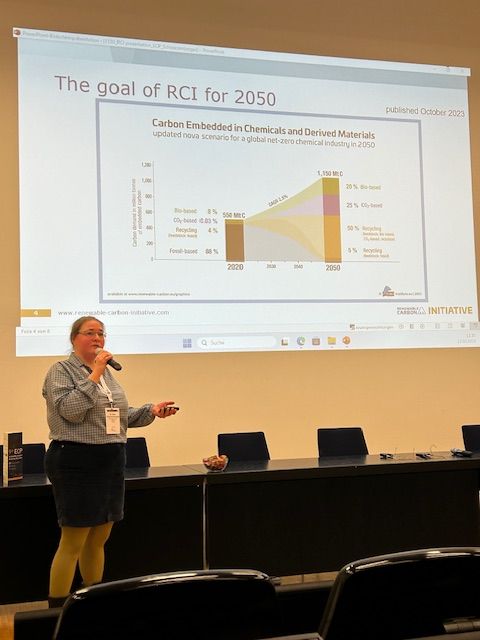
RCI once again participated in this year's ECP in Frankfurt am Main, Germany – the 9th European Chemistry Partnering, a partner of RCI, is a leading business interaction event in the chemical industry providing pitches, keynotes, partnering sessions and workshops. ECP serves as a vital platform for exchanging ideas across the industry's value chain, connecting decision makers, innovators and investors.
RCI was honored to host a session with three innovative RCI companies that are members of the RCI:
- Maximilian Webers of COLIPI (DE), https://colipi.com
- Rasmus Toome of Fibenol (EE), https://fibenol.com
- Vincent Daub of Greenlyte Carbon Technologies (DE), https://www.greenlyte.tech
They presented their exciting technologies, latest developments, and future outlooks.
As always, ECP provided a wealth of networking opportunities and potential collaborations – bridging innovation, collaboration, and growth through both on-site and online participation options, bringing together bright minds and innovative ideas.
For more information, visit: https://www.european-chemistry-partnering.com
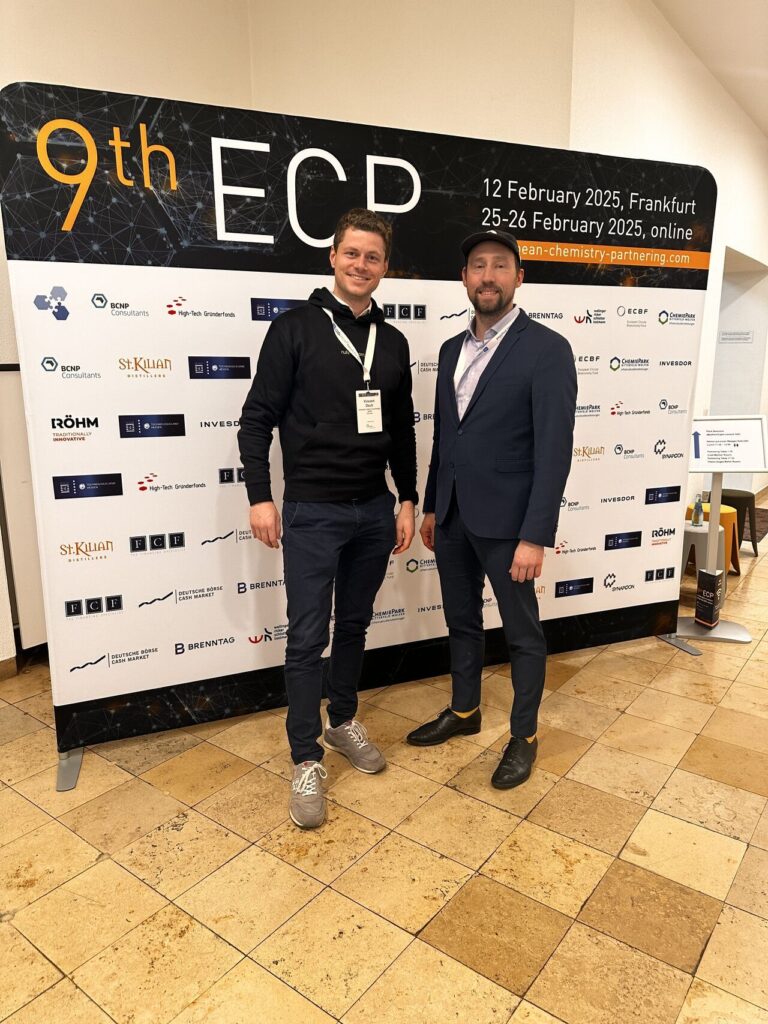
6. RCI ambassador activities
28 January, PubAffairs Brussels: Panel discussion on the “potential of bioethanol in the chemical industry”, hosted by ePure, with DG ENER, DG AGRI, ethanol industries.
5-6 February, Bio360: RCI members Futerro (BE), CovationBio (US), TÜV Austria (BE) and Michael Carus for RCI hosted a session on renewable carbon at the Bio360 (room “circular”) covering innovative strategies, examples of successful bio-based solutions, and the latest advancements in certification processes.
12 February 2025, ECP: RCI was invited to host an RCI pitch session, including a short pitch on RCI and then pitches by our members Colipi (DE), Fibenol (EE) and Greenlyte Carbon Technologies (DE).
17 February 2025, UNIDO and Molecule Group Chemicals Workshop: RCI and several member companies of RCI (Avantium, BioBTX, Braskem and Lenzing) joined a workshop on sustainable chemistry in Vienna. The Molecule Group is a newer entity looking to discuss sustainable chemicals and fuels at the G7, G20 and COP levels.
26 February 2025, Cefic: High-level event in Antwerp on the day of the unveiling of the Clean Industrial Deal, hosted by Cefic and other parties of the Antwerp Declaration.
27 February 2025, 6th Co-Implementation Meeting on the transition pathway: meeting in Brussels by DG Grow F.2 – Bioeconomy, Chemicals & Cosmetics on the “Transition Pathway for Chemical Industry”.
7. Cellulose Fibres Conference 2025 – New with Biosynthetics, 12-13 March, Cologne
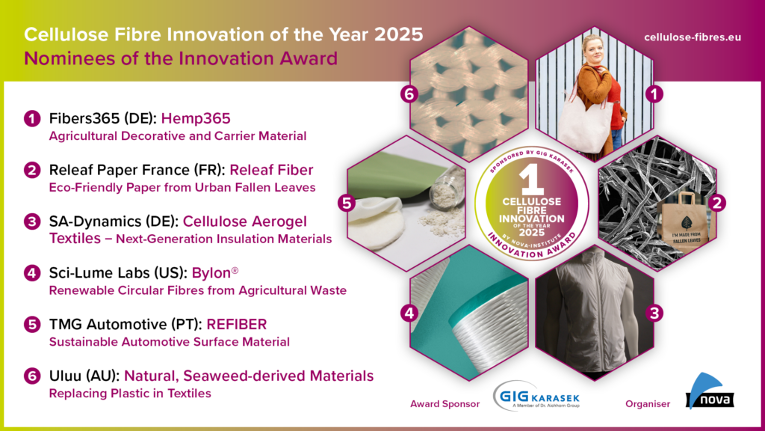
The unique conference focuses on cellulose fibres – in textiles, hygiene products and packaging. 214 participants from 23 countries joined the past conference in Cologne, Germany. The conference will present the most successful solutions based on cellulose fibres that are currently available on the market, new developments and approaches and also sheds light on the policy framework. So far, already 160 participants from 20 countries registered – more than 200 will be expected.
The conference will again cover the entire value chain of the sustainable textile industry, from lignocellulose, pulp, cellulose fibres such as rayon, viscose, modal or lyocell and new developments to a wide range of applications:
Textiles from renewable fibres, nonwovens such as wet wipes, as well as areas such as composites, hygiene, packaging or nanocellulose in the food industry. This year, for the first time, the conference will include a dedicated session on biosynthetics – a promising area to complement the alternative for bio-based textiles. Deep insights will be offered into the future of cellulose fibres, which fits perfectly with the current shift towards circular economy, recycling and sustainable carbon cycles.
More information, programme, Innovation Award, participants and exhibitors: https://cellulose-fibres.eu
8. New RCI Members
In February, we would like to welcome two new RCI members:
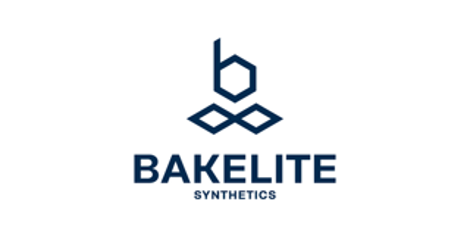
Bakelite (US) is a global integrated producer of specialty thermoset resins, systems and engineered thermoset moulding compounds. Their pioneering innovation has not only made homes stronger and transportation safer, but has also taken them to new heights - including ventures into space. Find out more: https://bakelite.com
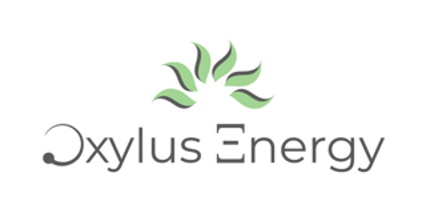
Oxylus Energy (US) is a start-up focused on decarbonising the hard-to-abate sectors of aviation, shipping, and chemicals, responsible for ~11% of global emissions. This is done via breakthrough CO2 electrolysis that directly convers carbon emissions and rebuilds them into methanol – the world’s second largest traded commodity chemical. Direct conversion of CO2 to methanol creates a path to industrial decarbonisation and alternative fuel supply all while decreasing atmospheric carbon dioxide. Find out more: https://oxylusenergy.com
Source: Renewable Carbon Initiative, original text, 2025-03-05.
